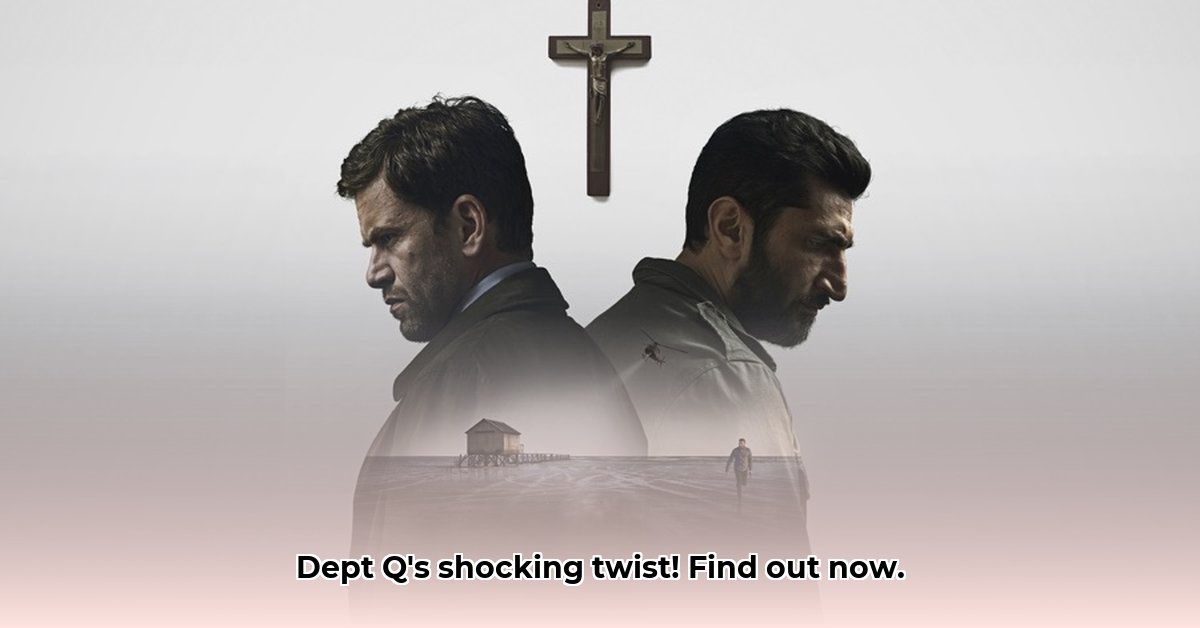
Right, so Netflix's Dept. Q has wrapped up, leaving us with more questions than answers – and a bloody cliffhanger to boot! This isn't just a recap, tjom, we're diving deep into that finale, pulling apart every twist and turn, every sneaky flashback, and every morally grey character. Expect a proper post-mortem, dissecting the motivations, the reveals, and the lingering questions that'll keep you up at night. Let’s get into it.
The Kidnapping: A Twisted Game of Revenge
The whole shebang hinges on young Merritt Lingard's disappearance. It wasn’t a simple kidnapping; it was a meticulously planned act of revenge orchestrated by Lyle and Ailsa Jennings, driven by the gut-wrenching loss of their own son. Their use of Lyle's fake identity, Sam Haig, brilliantly misled the police, highlighting the flaws in the system. Their actions are undeniably horrific, yet their desperation – born from unbearable grief – is almost palpable. This isn't just a crime; it's a powerful exploration of grief and the lengths people will go to for justice, or rather, their perceived version of it. How far is too far when your world has been shattered?
Unraveling the Truth: More Than Meets the Eye
The finale reveals the Jennings’ complete plan – a cunning scheme targeting those they believed responsible for their son's death. DCI Morck and his team's relentless investigation slowly unravels the truth, a bit like untangling a particularly stubborn knot of fishing line. But here's the kicker: the investigation exposes serious cracks in the foundation of the police force itself – highlighting how easily crucial details can be overlooked. This wasn't just a kidnapping; it was a damning indictment of systemic failures within the system. Isn't it chilling how easily things can fall through the cracks?
Character Motivations: A Deep Dive into the Human Psyche
Dept. Q doesn't shy away from exploring the complexities of its characters. We witness the raw, searing pain of the Jennings, their desperation a direct consequence of their loss. But it's not just the criminals who are explored. DCI Morck's own troubled past mirrors the darkness within the criminals he pursues, turning him into more than just a detective; he's a man wrestling with his own demons. This nuanced portrayal elevates the show beyond a typical crime drama, forcing viewers to question the very definition of justice.
Story-Telling Magic: Suspense That Keeps You Hooked
Dept. Q masterfully uses flashbacks to weave its complex narrative. These aren't just filler; they are crucial to understanding the characters' motivations and how the seemingly disparate plot lines converge. These strategic reveals keep you constantly guessing, ratcheting up the tension and intrigue. It's this attention to detail that sets Dept. Q apart from the average crime thriller.
The Cliffhanger: A Brutal Ending
And then… bam! The finale leaves us with a brutal cliffhanger: DCI Morck is shot. That leaves us hanging, desperate for answers – who pulled the trigger? Why? And what does this mean for the future of the investigation, and for Morck himself? It's a classic – and effective – move, leaving the viewer wanting more (and probably needing a stiff drink).
Dept Q: The Verdict
Dept. Q Season 1 is a triumph. It delivered a compelling mystery, explored its complex characters with depth and nuance, and used intelligent storytelling techniques to keep viewers utterly captivated. The ending, while resolving the immediate mystery of Merritt's kidnapping, cleverly leaves a crucial question dangling: Will DCI Morck survive? It’s a cliffhanger that leaves you breathless, desperate for a Season 2. What did you think? Share your thoughts and theories in the comments below! Let's chat.
How to Solve the Unresolved DCI Morck Shooting in Dept Q Season 1
Key Takeaways:
- The Lingard kidnapping was a carefully orchestrated act of revenge, highlighting systemic failures within the justice system.
- The Leith Park shooting serves as a disturbing parallel, reflecting corruption within the police force.
- DCI Morck's personal struggles mirror the systemic issues within his own department, creating a compelling narrative.
The unresolved shooting of DCI Morck is the perfect cliffhanger, leaving viewers anticipating answers. It's a testament to the show’s skill in building suspense and cleverly interweaving multiple plotlines. It leaves you questioning everything – the system, the characters, and even your own perception of justice. What do you think happened? What are your theories? Let's hear them in the comments!